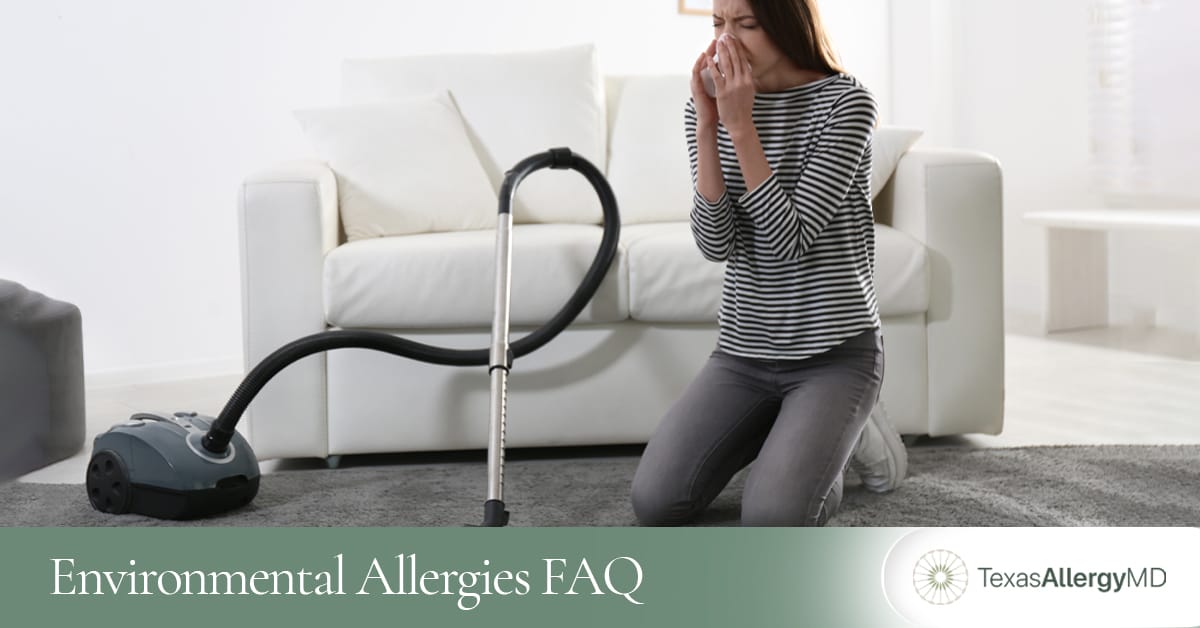The Most Common Questions & Answers About Environmental Allergies
Living with environmental allergies makes even the simplest parts of life a little hectic, and TexasAllergyMD sees the effect this has on people every day. In fact, many people find themselves keeping tissues or over-the-counter medications on hand just to get through the day.

However, multiple innovative and effective treatments for environmental allergies have changed lives for the better, and many people no longer constantly reach for a box of anything! Of course, there are many questions about how to get to that kind of freedom.
Answers to Common Questions About Environmental Allergies
When people search online for relief from environmental allergies, they often find plenty of information. Unfortunately, they may end up with more questions than answers. To help provide the good information people are looking for, below we’re listing the most common questions and answers about environmental allergies that we receive.
How do I know if I have environmental allergies?
Environmental allergies often increase in severity when you come into direct contact with the allergen you’re sensitive to. For example, someone allergic to dogs may experience itching, sneezing, and other aggravated symptoms when they encounter a dog’s pet dander. Once they leave that environment, the symptoms often subside. The best way to know for sure if you’re dealing with environmental allergies is to undergo testing by a board-certified allergist.
Can you develop environmental allergies later in life?
Yes, it is possible to develop environmental allergies later in life, even without prior predisposition. Adult-onset allergies are common and can occur due to changes in environment, location (moving from one geographic area to another), stress, aging, immune system changes and more.
What is the difference between seasonal allergies and environmental allergies?
The difference between seasonal and environmental allergies lies in the triggers, onset time and duration. Environmental allergies are persistent (and involve both indoor and outdoor allergens), while seasonal allergy symptoms tend to occur when plants and trees shed pollen at various times of year.
What are the symptoms of environmental allergies?
The symptoms of environmental allergies can include congestion, coughing, wheezing, runny nose, postnasal drip, sneezing, itchy or watery eyes, scratchy throat, sensitive or itchy skin, hives and fatigue.
How do environmental allergies feel different from a cold?
The main difference between environmental allergies and the common cold is that colds are usually accompanied by fever and body aches that last 7–10 days. Allergy symptoms, however, are continual when the allergen is present. Also, mucus from a cold tends to be thicker and may be colored, while mucus from allergies is usually clear.
Do environmental allergies make asthma worse?
Environmental allergies can make asthma symptoms worse and may lead to an asthma attack. Because pollen, pet dander, mold spores or dust mites can trigger an allergic response that compounds asthma symptoms, having an asthma action plan is imperative.
How do doctors test for environmental allergies?
Allergy doctors use various methods to test for environmental allergies, including skin prick tests and blood tests. Skin prick tests use tiny amounts of allergens to check for a reaction, and when skin testing is not possible, blood tests are used to measure specific antibodies.
Do allergy shots help with environmental allergies?
Yes, using allergy shots, or subcutaneous immunotherapy (SCIT), is an incredibly helpful treatment for environmental allergies. By injecting gradually increasing amounts of specific allergens into a person’s body over time, their immune system will develop a tolerance.
Can environmental allergies go away on their own?
While it is possible for environmental allergies to go away on their own, it is more common for the condition to persist. The best way to address this is to make an appointment with an allergist for testing and treatment.
Does allergy desensitization treat environmental allergies?
Yes, allergy desensitization can treat environmental allergies. Allergy drops, or sublingual immunotherapy (SLIT), is one of the newest treatments that help people breathe clearly and see a reduction in symptoms over time.
Get Expert Help for Your Environmental Allergies Today
Don’t delay any longer, start on the path to relief from your environmental allergies today. Dr. Mireku at TexasAllergyMD has experience treating all types of adult and pediatric allergies and asthma with leading-edge treatments. Call us today at (469) 375-1525 or request an appointment.
A New Standard in Allergy Treatment & Care
Ask Us a Question
Achieve Lasting Relief From Allergies
Allergies
We identify the root cause of your allergy and provide practical solutions for a more comfortable life.
Food Allergies
Food allergy specialist Dr. Mireku helps you live life to the fullest with caring, patient-focused care.
Allergy Testing
Understand your actual allergy triggers with precision allergy testing at our allergy treatment centers.
Allergy Treatment Options
Allergy relief starts with our holistic allergy care and innovative desensitization treatments.











